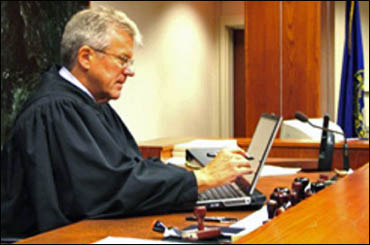
Procedural Fairness: The Basics
One of the seminal voices in the procedural fairness field is Professor Tom Tyler. He has authored many of the foundational texts and articles on procedural fairness. A full listing of his published works can be found here. Professor Tyler's powerpoint presentation and lecture on procedural fairness provides a thorough overview of the field as well as practical considerations for applying procedural fairness in a courtroom or courthouse.
Other organizations also recognize the importance of procedural fairness and include basic resources on their websites. The Center for Court Innovation hosts a page on its website that provides interviews on procedural fairness from Judge Kevin Burke and Professor Tom Tyler and other useful resources. Assistant Attorney General Laurie O. Robinson recently spoke at Center for Court Innovation's 2012 International Conference of Community Courts. There she highlighted the important role procedural fairness plays in the success of community courts.
Likewise, the United States Department of Justice Community Oriented Policing Services (COPS) Office hosts a website with practical resources on implementing procedural fairness. COPS advances the practice of community policing in America's state, local and tribal law enforcement agencies, a practice highly related to procedural fairness.
Procedural Fairness and Court Reform
Procedural fairness offers a basis for more than a series of individual practices that judges and courts can implement. David Rottman of the National Center for State Courts argues that procedural fairness is sufficiently powerful to provide a basis for a renewed American court reform agenda in his article "Procedural Fairness as a Court Reform Agenda."
Other articles focus on specific components of the justice system, such as pretrial risk assessment and policing.
Pretrial Risk Assessment
State of the Science of Pretrial Risk Assessment Cynthia A. Mamalian
Cynthia Mamalian's article discusses procedural justice in the context of pretrial risk assessments and procedures. Procedural justice in this context uses research based approaches to protect important rights during pretrial criminal processing while also helping the jurisdiction maximize its limited jailhouse resources.
Policing
Profiling and Police Legitimacy: Procedural Justice, Attributions of Motive, and Acceptance of Police Authority Tom R. Tyler and Cheryl J. Wakslak
This article examines four studies related to procedural fairness, police authority, and the perception of racial profiling. The article demonstrates that the more fairly the police exercise their authority, the greater the public support for the police. The greater the public support for the police, the less likely the public will believe that the police are racially profiling.
Legitimacy and Cooperation: Why Do People Help the Police Fight Crime in Their Communities? Tom R. Tyler and Jeffrey Fagan
Based on the results of a panel study, this paper notes that procedural justice is key for the creation of the legitimacy of the police in an individual's personal experience. This personal experience is then a key component of the individual's future willingness to cooperate with police. Effectively, a police department that acts in accordance with procedural justice will be viewed as legitimate by individual members of the community, making them more likely to cooperate with that police department.
Victim Services
What Fairness means to Crime Victims: A Social Psychological Perspective on Victim-Offender Mediation Jo-Anne Wemmers & Katie Cyr
2 Applied Psychology in Criminal Justice 102 (2006)
Wemmers & Cyr looked at procedural fairness in relation to the victims of crimes and the impact procedural justice had on their perceptions of the court system. They found that that in the mediation context victims wanted to be recognized and respected, not just heard. It was important for caseworkers to engage with the victims, not merely listen to their stories.
